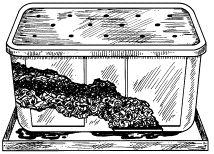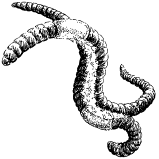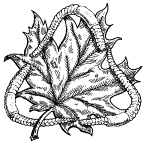 Vermicomposting (from the Latin word vermis meaning worm) is an efficient and effective method for turning kitchen waste into a rich compost. Some of the benefits of keeping a worm farm include:
Vermicomposting (from the Latin word vermis meaning worm) is an efficient and effective method for turning kitchen waste into a rich compost. Some of the benefits of keeping a worm farm include:
- Recycling kitchen food waste,
- Reducing waste,
- Having a ready supply of fishing worms, and
- Producing soil amendments and/or fertilizer for garden plants.
Red Worms
Red worms, known also as red wigglers or manure worms, are the most effective worms to use for worm composting. They are capable of consuming their own weight each day in raw organic matter.
 Where are they found? - Red worms feed on dead plants and animals and are commonly found in leaf litter, manure piles or from a local bait shop.
Where are they found? - Red worms feed on dead plants and animals and are commonly found in leaf litter, manure piles or from a local bait shop.
What do they look like? - Red worms are two to four inches in length and red in color.
How long do they live? – They have a life span of about one year and reproduce quickly. Light colored cocoons are produced continuously that yield two to three baby worms in three weeks time.
Supplies Needed
- An aerated container (i.e. large Cool Whip tubs)
- 10 red wiggler worms
- 1 tablespoon of outside dirt or compost
- ½ page of 8 ½" x 11" white paper shredded into thin strips for bedding
- 1 cup of water
- 1 small bowl
- Crushed egg shells or apple peels cut up in small pieces
Instructions
- Have an adult punch approximately 12 holes around the sides of the container and 25 holes in the lid for air.
- Pour water in separate bowl, tear paper into strips, and place into water. Squeeze water from paper and place in container.
- Place dirt or compost in container.
- Add small pieces of food scraps to container (no meat or dairy products)
- Mix together all contents in container.
- Add worms to container. Observe how the worms immediately go down under the paper to avoid light.
Bedding
 Bedding provides the red worms with the cool, moist environment they need to thrive. The red worms will tunnel through and digest the bedding along with the food scraps to produce vermicompost. They will not crawl out of their bin unless the bin becomes too dry or too wet.
Bedding provides the red worms with the cool, moist environment they need to thrive. The red worms will tunnel through and digest the bedding along with the food scraps to produce vermicompost. They will not crawl out of their bin unless the bin becomes too dry or too wet.
Location
Red worms are most efficient at consuming organic matter and reproducing when they are kept moist and well ventilated in a temperature range of 55º – 75º F. Keep the worm farm covered and out of direct sunlight because red worms are sensitive to light. Basements, cool garages and kitchens are all good locations.
Feeding
Feed your worms two to three times each week by burying appropriate food scraps under the bedding. The smaller the food scraps, the quicker they will be digested by the red worms.
| Acceptable Foods |
Non-Acceptable Foods |
| Coffee filters/grounds |
Meat/fat |
| Tea bags |
Grease/oils |
| Crushed egg shells |
Dairy products |
| Citrus peels |
Pet waste |
| Cereal/bread |
Plastic wrap/foil |
Fruit/vegetables
(no onion or garlic) |
Chemicals, glass, metal |
- During the observation process, periodically check the container to see the results. If the paper dries out, mist with a spray bottle.
- The vermicomposting process takes 4-8 weeks (depending on the size of the bin) before all the bedding and waste will turn into humus, the end product.
- The end product of vermicomposting will contain worm castings (manure), decomposed bedding, and worms and tiny organisms dead and alive. The humus can be added to potting mix for houseplants or the end product and worms can be placed in the garden to enrich the soil.
- Do not release the worms during cold weather as they will not be able to dig through frozen ground.
For more information, contact The Waste Diversion and Utilization Program at 410-537-3314.